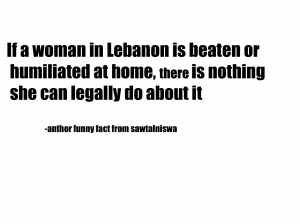
Well, with everything happening in my personal and in the region around me, I feel kind of silly being so angered by the polemic surrounding Nemr Abou Nassar’s sense of humour. But here it goes.
Background: This post was inspired by two articles Searching for Nemer AbouNassar’s Sense of Humor written by Labwah Ahmad on SawtAlNiswa to which Rita Kamel responded on her site RitaKml.info with an article titled My take on the “Searching for Nemr AbouNassar’s Sense of Humor” article.
It would also be useful to point out that the reason why I was angered by this response was simply that I follow Rita online and I often learn from her.
So Rita, I want to speak to you, not necessarily as a feminist myself, and certainly not as an activist, which I believe to be a vague and overused term that no longer means anything.
First of all, let’s talk about the main point being argued, Abou Nassar’s sense of humor. You say that his jokes were not sexist based on the fact that he’s a stand-up comedian and he is portraying Lebanese society as it is.
On one hand, I understand. I understand that this is the eternal argument: where does humor end and where does offence, if not hate-speech, start? And I understand that each has her/his own borders. If you make a joke about my uncle’s body rotting in the blazing September sun in ‘78 and about what a retard my grandmother must have been for mourning him till the last day of her life… I won’t find that funny. However, maybe my cousin will find it funny, and what makes my opinion more righteous than my cousin’s? I mean it’s his uncle, too, we’re talking about; if he finds this joke funny, why don’t I just suck up my oversensitive ass and laugh.
Well, nothing makes me more right than my “more fun” cousin. What I do know is that for me, humor ends at the limit of offending people. If you know that your joke is hurtful, then I expect you not to make it.
And Abou Nassar knew his jokes were being considered as sexist, he was repeatedly called out on the level of offensive language he uses.
Do you remember the celeb tweet-up last year? Back then Abou Nassar was giving a stand-up comedy show, and I was there. I was very angered by his redundant jokes about lesbians, how ugly they are and about women, (and I apologize for not remembering the exact wording, I wasn’t going there with the intention to detect sexism or homophobia).
Point being, that I didn’t know Abou Nassar. I posted my opinion about his lesbian jokes and his women jokes. And unlike what you say about him taking “the time to listen and answer to all of his supporters wherever he goes”, he never responded to me, no one actually responded to me. And obviously nothing changed in the content of his jokes.
Unless what you meant by your line that he responds to loyal supporters, those who come to him to tell him how they loved his show… That would be a different issue w aslan I doubt that that would be what you meant.
And what was Abou Nassar’s reaction to Lubnah’s article? Calling them HaterZ, full of shit and lies, psychotic, insane, and stupid. Is this also part of his sense of humor? He did not address the issue at hand, he did not defend his humor, he did not “talk”. He resorted to name calling, and I have little to no respect for such bullying strategies.
I understand he may have felt a bit taken off guard, and maybe publicly attacked and didn’t feel confident about responding in a constructive way… One can even argue that the article was aggressive and didn’t leave much space for communication. But then again, if he would have addressed this issue before, like when he was called out on it before, he wouldn’t have put himself in a position where he would be publicly shamed on such a public platform.
We all know stand-up comedians, and yes they always resort to stereotypes and generalizing for character construction. But there are certain, very basic rules: the famous comedians don’t make fun of anyone for who they are, but for what they do.
We can laugh at the kid next door with a disability, or that girl who has facial hair, the neighbour with a mutilated face, calling them monsters and stuff. It would be hilarious… to 9 year-olds. This is something we grow out of it, and if we don’t grow out of it, the hurtfulness of this “humor” is not justifiable.
Also, when most comedians joke about sensitive topics, disadvantaged groups, or minorities, they clarify their position one way or the other. Jeff Dunham, for example, always has a puppet and when the joke involves hate-speech, he intervenes as Jeff Dunham condemning the puppet character’s discourse. This way he acknowledges and laughs about the stereotypical joke, but also frames it as such.
Jon Stewart regularly assumes the role of a right-winger in the US in his Daily Show, he uses their arguments and their rhetoric, then slowly deconstructs it highlighting its stupidity. He doesn’t just repeat it and let each make her/his assumption about whether Stewart condemns or agrees with the statement. And Jon Stewart literally tackles sensitive and “scary” topics. The guy addressed the issue of Veil/Niqab ban in the West and made the connection between the body policing of head covers that Western Feminists denounce and the lack of body policing in the West of things like high heels.
And so on, this is stand-up comedy: laughing without offending. What Abou Nassar does is so far from that, his humor is pre-teen humor.
Basically my point is that Abou Nassar’s insults are not just a type of humor and his status does not justify everything. A lot of moral judgments are framed as jokes. So unlike actors, who are assumed to be acting, comedians also put their own belief systems into their shows, and thus have a responsibility.
On the other hand (Re: portraying the Lebanese society), there’s a lot of shit in this society. And as you said, you would know. And since you know, why do you approve and support and defend the normalization of such roles and such beliefs?
It is true that humor can be a tool to dismantle systems of oppression, we can here give examples from all over the world, in various contexts and with various levels of success. We can talk about how Egyptian activists broke the aura of fear surrounding their ex-president by making fun of him years ago. We can talk about how Queer people ridicule gender roles as a therapeutic practice to relieve the stress of gender conformity.
But what Abou Nassar does is not demystifying, quite the opposite. What he does is reinforce systems of discrimination. He is not making fun of sexism, he is using sexism and sexist statements to make a sexist target audience laugh.
If he was questioning sexism, his jokes would… well, question it. Instead of just borrowing the line about women and “nos 3a2l djeje khawta”, laughing and moving on to the next Lebanese cliché, he would have added any kind of funny hint or criticism to the “nos 3a2l djeje khawta” statement. Anything to make his position clear. Because you could say that he doesn’t mean it that way, but another fan, could very legitimately say it’s actually true that 100 mara bnos 3a2l djeje.
Binniheye, public statements (including stand-up comedy) have to be more clear, at least when it comes to core values. A stand-up comedy gig is not a private gathering of friends who know each other’s background and stands on fundamental issues.
Joking is also a very strong agent of mainstreaming oppression, we make jokes on Africans and “Serelankiyyet” making them look stupid and ridiculous, so we don’t have to confront our ignorance of their language(s). We make sectarian jokes about how these are smelly, and those have tails, and those are selfish. Remember Moukarzel’s “Mon Bijou, Mon droit? Or FPM’s “Soit belle et vote”? Those were also playing on the humor side, but it was offensive. We make jokes about Hamasne and Nawar and Akrad and Armenians and Palestinians, the patterns are the same. It is always jokes and we always portray them as stupid, ugly, unclean, and not as human as we are.
Actually, I will never be able to explain this point better than this article: The Terrible Bargain We Have Regretfully Struck
Other than that Rita, you said:
“Actually, I’m so upset that this article featured on Sawt El Niswa. I don’t even understand how could a respectful organization have accepted to have such an article featured on their website. What gives the writer(s) of the above mentioned article the entitlement to think they are the voice of the women that way? Why not attack the Lebanese actors who impersonate husbands who beat their wives in local sitcoms on TV while at it? Because they are ACTORS… They ACT by impersonating whomever they are supposed to impersonate and act like him.. Does that mean that they ARE the character? Does that mean that they are violent and sexists and etc…? OF COURSE NOT!”
Actually, I am upset, too, I am upset that you would defend Abou Nassar’s “humor”. I understand we can disagree on what is funny and what is not, but there is no need for this kind of talk. Sawt Al Niswa is a platform for Feminist discourse, there is no need for anyone to shame them for pointing out sexism. You can disagree and argue back, but waving a finger and emotional arguments are not an argument.
The articles are not necessarily representative of the collective’s specific opinion on a specific issue, as long as the articles posted on the magazine respect Nasawiya’s core-values. I would have objected if Nasawiya would have censored Lubnah’s article; Abou Nassar is not above criticism.
And at the opening of your article you wrote:When giving an opinion or attacking a person, it’s useful to spell the name correctly in order to help readers know who is the person concerned. Using an online search engine would not have harmed anyone. As a matter of fact, misspelling someone’s name is nowadays considered an offense since the name is directly linked to the identity of the person. The person I believe is concerned in that article is not “Nemer AbouNassar” but “Nemr Abou Nassar”.
I was not sitting in Lubnah’s mind when she wrote her article, but stretching a typo into a possible character assassination attempt, and the fuss over it is sad. I mean you misspelled Sawt Al Niswa, writing it Sawt El Niswa… It happens.
In the end, I don’t know Abou Nassar, I only know him as an artist and that is all I need to know about him. I don’t have to get know him and hang out with him just to know whether or not deep, deep inside he is sexist or not.
Publisher:
Section:
Category:






